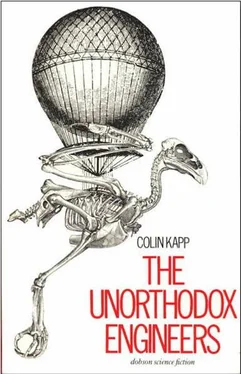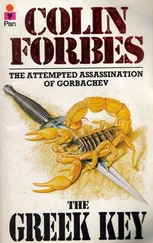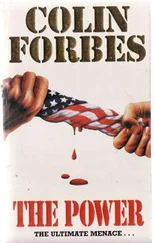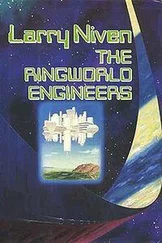‘Certainly—if you regard them as limitations?
‘Very well,’ said Jacko, ‘come and prove your point.’
By the time they arrived at the span the hot-spot was beginning to break. Even as they watched, the ground lurched and broke as the angry pressures blew the topsoil apart. Then came a heavier explosion, the ground cracked into a fissure and a column of fire spurted irregularly through a spray of liquid, incandescent magma, which congealed around the blowhole to form the foundations of the cone. About fifteen metres above, the span appeared to dance in the stream of heated gases, and was soon blackened and scorched . It’s demise was inevitable.
Ensign Harris came over at a run, pulling and old-fashioned mortar on a trolley, and was followed by Malu and two engineers carrying a rack of mortar bombs. They set up the mortar at a reasonable distance and proceeded to prime the bombs.
‘Are you crazy?’ asked Jacko.
‘Yes,’ said Fritz. ‘That’s my forte. I want to see what happens if we put a mortar bomb smack inside that crater. You’re the weapons expert. Can you do that without damage to the trestles?’
Jacko estimated the position silently. ‘With a couple of ranging shots I can pin the hole all right, but the trestles will be in the hands of the gods.’
The result was even more spectacular than anticipated. The first shot fell short, and the mortar was adjusted slightly to lower the trajectory a fraction. The second bomb rose in a brief arc and fell with careful precision into the mouth of the flaming cone. A split second’s pause and then Hell itself was unleashed. The pyramid of toffee magma split wide with a murderous roar; gouts of flame and incandescent lava boiled and foamed high into the air and collapsed into a storm of white-hot cinders and writhing jets of burning gas. At the base, where the cone had stood, the blowhole angrily vomited a widening pool of boiling lava like some grotesque festering sore.
‘Another?’ asked Jacko.
Fritz nodded. ‘We might as well be fried sheep as roast lambs.’
The third bomb, too, was accurately placed. This time the lava rose like a living wall and plunged outward, splashing and streaming its magnificent debris up to thirty metres from the seething well. A sheet of roaring flame rose up with frenzied fingers and enveloped the protesting members of the rail-span overhead.
The blast of heat and awesome fury sent the watchers scurrying for shelter, with Harris fearing for the safety of his remaining munitions. Only Fritz stayed put, his clothes smouldering, shielding his eyes with his hands and overcome with the enormity of the havoc he had wrought. Then the flaming torches died and the white-hot spume grew less. The lava pool became a darkening puddle of red toffee, shot with occasional bursts of recalescent heat and overhung with the will-o’-the-wisp of burning sulphur.
‘One up to me,’ said Fritz van Noon.
By morning the remains of the volcano held no visible sign of life. The lava had spread into a vast rippled puddle of rock, still hot but solid enough to bear a man’s weight. Already the lichen was beginning its assault on the cooler regions, eager to begin the symbiosis with the grass to follow.
Jacko had the calculations finished by the time that Fritz was ready to inspect.
‘Fritz, you’re a ruddy genius! There’s enough material in this puddle to make two average-sized volcanoes in this district. That means we’ve cleared it out completely. With a bit of luck they won’t have another volcano here for the next sixty years or so. Unless an eruption happens right under a trestle leg we can treat it the same as this one. That simplifies life no end.’
‘Precisely,’ said Fritz. ‘But it’s the trestle legs I’m worried about. Pile-driving those base supports makes the trestles rather vulnerable. What happens to your railway if your trestles suffer a high mortality rate?’
‘I think we quit,’ said Jacko candidly.
‘Not on your life,’ said Fritz. ‘We’ve got enemies. If UE goes home with it’s collective tail between it’s legs they’ll try and break us for sure. We’ve got the largest collection of screwballs and technical malcontents in the whole army. Not one of them would be happy about returning to honest engineering while they can stay with us and play forsaken children’s games under the minimum of effectual supervision. As officers, we have a responsibility to these guys. We can’t just let them be pissed on from a great height. Besides which, there’s more than the Cannis railway at stake here.’
‘I guess you’re right,’ said Jacko. ‘But look at the problem. We can’t put a straight track run on the ground because of the cones in the way. Even if we could it would take years to level up the site. Therefore we build on trestles and spans over the rocks and smaller cones. That makes sense even if it looks grotesque. But you can’t stop a volcano which comes up under a trestle. That’s what has been killing this railway since it was invented.’
‘I can,’ said Fritz slowly. ‘But it’s a dangerous thing to try. You see, there is one place on Cannis where a volcano never rises.’
‘I doubt it.’
Fritz grinned. ‘Oh ye of little faith.’ He waved an arm in the general direction of the desert. ‘An old and weathered volcano will eventually crumble and be replaced by another one, but a new eruption never rises where an previous one still stands. Pressure difference, I suppose.’
He broke off suddenly with a puzzled frown.
‘I thought I heard a chopper. Are we expecting any visitors?’
Jacko found a pair of field glasses and studied the helicopter rapidly growing larger in the lens.
‘Trouble!’ he said. ‘Looks like Admin has found out where we are. That’s a deputation from Hellsport unless I’m very much mistaken.’
‘Shit!’ said Fritz. ‘Can’t you head them off. I’ve got work to do. I bet it’s that lousy planning group come to foul things up.’
There were two Terran civilians in the helicopter. The taller of the two was clearly a classic, pompous pen-pusher, whilst his companion seemed to be some kind of technical consultant. On the way down from the landing raft they made a rather pointed inspection of the piles of girders and miscellaneous metalwork which littered the camp, and the short man took it upon himself to explain to his companion certain niceties of railway construction which Fritz appeared to have overlooked. By the time they reached the office they were clearly in the mood for business.
‘I’m Eldrick, Planning and Co-ordination,’ said the tall civilian. ‘I think you would be Mr Noon.’
‘Lieutenant van Noon,’ corrected Fritz wearily. He was proud of his Dutch heritage. ‘I thought Colonel Nash agreed not to waste resources sending Admin out here to count the paperclips.’
Eldrick smiled tolerantly. ‘I think you misunderstand our purpose. We are the group which co-ordinates the efforts of all units on Cannis IV to ensure that the maximum effort is concentrated in the right direction. We are here to help you.’
‘When UE needs help,’ said Fritz, ‘it helps itself. I haven’t come across an administrator yet who even knows what a spanner is. We’re independent, uncoordinated, unorthodox, and generally fireproof—and what’s more I have a certificate to prove it.’
Eldrick was unmoved. ‘I still think you’re making a mistake, Lieutenant…’
‘Listen,’ Fritz broke in. ‘The whole Cannis IV episode is a mistake. This misbegotten planet is some kind of cosmological joke. If you think you can create order out of chaos with a ruler and a pencil-sharpener then you have no idea of the complexities involved.’
‘Have you?’ asked Eldrick pointedly. ‘What about steel! You’re supposed to be recreating this railway system. But you can’t build a railway without steel. There are priorities to be arranged, specifications to be agreed, orders to be placed on Terra. Delivery charges… Organization is essential to the well-being of any major endeavour.’
Читать дальше












